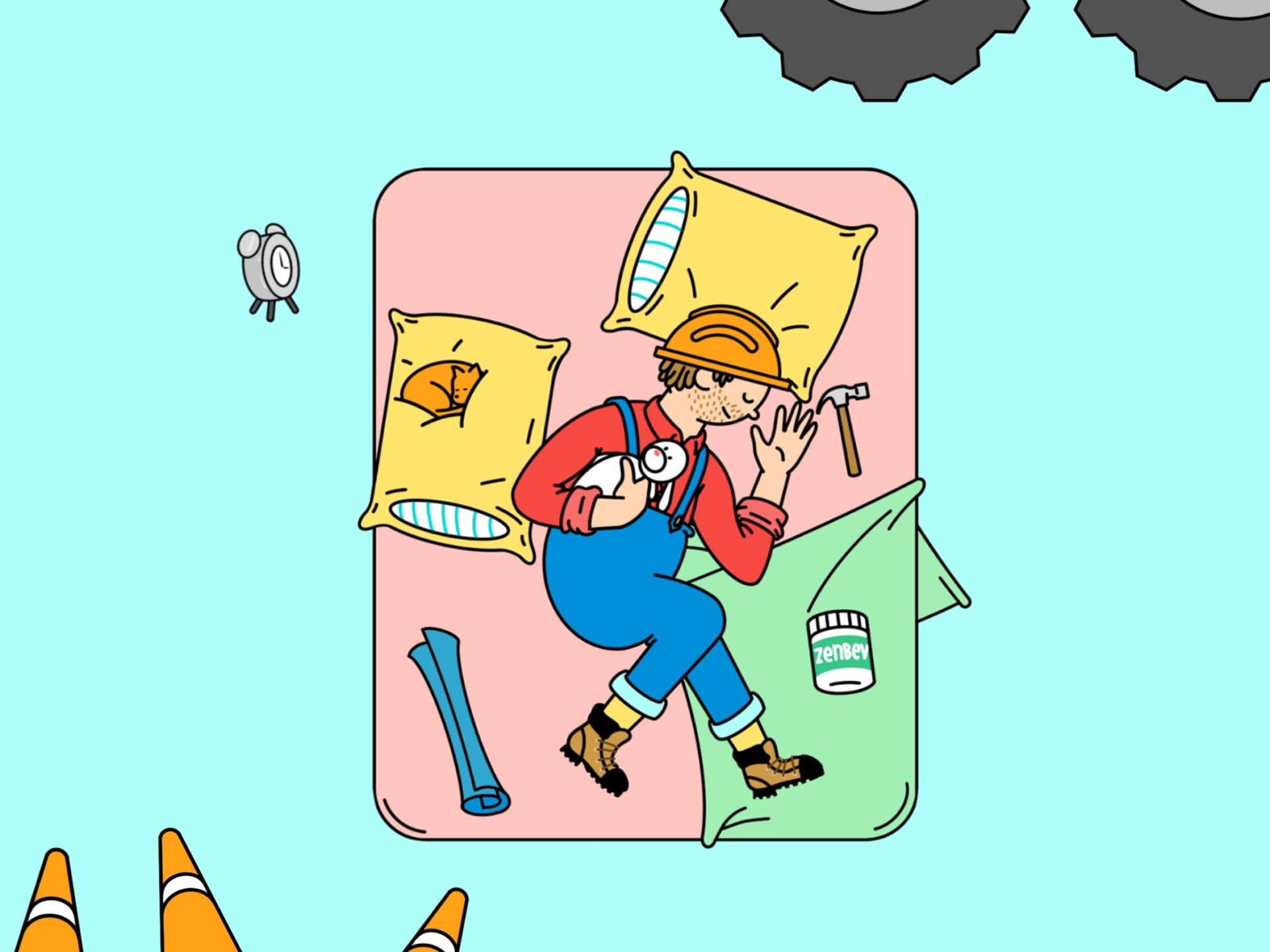7 Effective Ways to Cope with Stress and Anxiety

Stress and anxiety are difficult to deal with, and even more so as the world continues to be so unpredictable. When things get hard, it can be easy to shut down emotionally and physically, neglecting to take care of ourselves. We at Zenbev believe in having consistent coping mechanisms that you can fall back on when it all feels like too much. Read on to learn 7 simple and practical ways to deal with stress and anxiety.
1. Get Plenty of Sleep with Zenbev
In a previous article, we mentioned that being well-rested sharpens your mind and helps with both problem-solving and decision-making. It doesn’t stop there, though. Deep sleep, in particular, is believed to be beneficial for restoring the areas of the brain that regulates emotions and reduces anxiety levels. At Zenbev, we know how much anxiety can impact sleep quality. This is why our drink mix offers relief from bothanxiety during the day and time awake at night. Clinically proven, our natural anxiety remedy provides stress relief and promotes the restful sleep that you need for mental clarity.
2. (Safely) Connect With Others
While some of us aren’t able to be with our loved ones at this time, we’re lucky to have technology on our side. Video calls and FaceTime sessions with friends and family are excellent ways to stay in touch. Connecting with loved ones is not only great for beating social isolation but also serves as an opportunity to express what you have been experiencing. Talking through things with people you trust can help you release built-up tension and see the situation at hand more clearly. If you’re not comfortable sharing your feelings with your circle, it can be helpful to speak with a licensed counsellor who can help you work through the problems you are facing.
3. Take a Break from the News and Social Media
There’s a lot going on in the world right now. It’s perfectly normal to be curious and to want to be aware of the latest breaking news. As great as it is to stay informed, you must know when it’s time to unplug. The doom and gloom headlines that we see on a regular basis can trigger anxiety and make us feel increasingly helpless and worried about the state of the world. When it gets to this point, it may be best to cut back on our information intake. We can do this by listening to a lighthearted podcast or some upbeat music instead of listening to the news. Unplugging also allows you to make time for some of the other activities on this list, like getting lost in a great fictional novel!
In today’s world, news often seeps into social media, making it difficult to separate the two. If you feel that you need to get off social media for a bit as well, do that. You may also want to consider temporarily unfollowing or muting certain accounts that make you feel uneasy.
4. Practice Relaxation
Relaxation can look like a lot of things to a lot of different people. But one thing is for sure, it is an emotional state that allows us to be free of tension and anxiety. Take your mind off things by getting creative with activities like painting or even working on a puzzle. If you have a bathtub, treat yourself to a warm soak with your favourite bubble bath mixture or Epsom salt. Throw in a good book and light a candle to make the experience extra relaxing! Some of the best relaxation activities don’t even require anything other than yourself and some patience. Practicing deep breathing when you feel stressed can help with calming your nerves, and potentially even improving your attention span.
5. Set Firm Boundaries
If you are working from home these days, it’s easy for your work-life balance to be thrown off, potentially leading to burnout. In order to avoid overworking yourself, you must get clear on your work hours, and communicate them with your team. When this is established, you’ll steer clear of urgent phone calls and e-mails from team members who may think you are available at any time of the day. Establishing firm work hours is also important for your well-being. When you stick to a consistent finishing time, you should make it a habit to put away everything you were working on throughout the day. Yes, we really mean everything. That means no reading over e-mails at midnight, and more importantly, no responding! It can be hard to switch off our work brains, but doing so allows us to conserve our energy and avoid potentially dealing with mental exhaustion.
Finally, separate your workspace from your bedroom or other areas of your home that are meant for unwinding. Although the idea of working from your bed may seem cozy, researchers warn of a weakened mental association between our beds and sleep, and a stronger one between our beds and wakefulness. Of course, for some, working from the bedroom is the only option. If you do, however, have the space in your home, consider switching things up by moving around – maybe working from the dining table one day, or even outside when the weather is nice. Not only does this make for a great change of scenery, but it can also boost your productivity.
6. Stay Active
We’ve all heard about how important it is to lead an active lifestyle. We don’t always follow through with this because, well, life sometimes just gets in the way. Work and personal responsibilities often leave us drained with no time for ourselves. And when we’re stressed, moving our bodies may not always be top of mind. Reminding yourself of all of the great benefits of physical activity may be a good motivator. Not only can exercise decrease muscle tension but it is believed to positively impact the serotonin levels in your brain – providing a mood boost. All bodies are different and all have different needs. Find a way to stay active that allows you to feel comfortable, whether that’s through yoga or aerobic exercise. Even just 10 minutes a day is great progress.
7. Challenge Anxious Thoughts
Understanding and identifying what you are experiencing is important for facing your anxiety. Anxious thoughts can look like jumping to conclusions, all-or-nothing thinking, and expecting the worst possible outcome. Determining whether the problem you are facing is within your control is a good place to start. If the worry is solvable, you can start brainstorming solutions to tackle it. If the worry is something that you cannot change, you must accept the uncertainty and work on letting go. You can acknowledge the worries you are having without getting too caught up in them. Do not push your thoughts away. Be curious, but simply let them pass. Another way to work through this negativity is to ask yourself questions. It’s a great idea to write down and answer some of the following:
- Is this thought true? How do I know that it’s true?
- What actually happened?
- What is the worst that can happen?
- If the worst did happen, what could I do to cope with it?
Final Thoughts
Stress and anxiety can feel overwhelming sometimes. Luckily, there are many simple ways to reduce the pressure that you are feeling. Putting your health and wellbeing first can allow you to change your outlook on life and feel empowered. It all starts with slowing down and looking inward to understand what you are feeling. From there, you must make the decision to commit to self-care.


